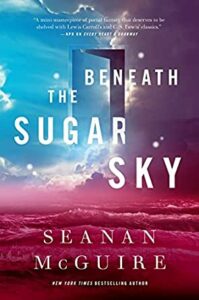Because I had enjoyed Sumi so much as a character in Come Tumbling Down, I picked up Beneath the Sugar Sky, which I had somehow missed when it was a Hugo finalist in 2019, expecting to find more of her and of Confection, the Nonsense world where she found her proper home. That turned out to be an error along the lines of watching “The Search for Spock” because you wanted to see more of Spock.
Sumi was dead, to begin with. Then her daughter Rini fell from a door in the sky into the turtle pond at Eleanor West’s Home for Wayward Children. Rini was born in Confection to Sumi and a candy-corn farmer in the years after Sumi defeated the Queen of Cake and ended her despotic reign. None of those events could come to pass now that Sumi was killed in Down Among the Sticks and Bones. Causality runs a bit differently in Confection, or Rini wouldn’t exist at all, but it is catching up to her. Having a mother who died before she could be born is gradually causing Rini to come undone. In the time that it has taken her to make her way to the Home, part of her hand has disappeared into the nothingness that will be her fate if Sumi can’t be returned to the living. Can Eleanor and her students help?
Despite the Home’s rule against quests (the other two are “No solicitations. No visitors.”), that is precisely what four of them do. Kade, the only student who does not want to return to the world behind his personal door, is Eleanor’s second in command. Christopher longs for his Skeleton Girl and the happy bones of Mariposa; if any of the current students know enough about Underworlds and returning someone from death, it’s Christopher. Cora is a new student and until recently a mermaid. She’s one of the two that Rini nearly lands on at the turtle pond. Nadya is the other, and she’s also looking for a way back to a water world. Rini has a bracelet from a wizard on Confection that can open doorways between the worlds, something that is usually nearly impossible, and soon the five of them are off to try to reassemble Sumi’s body and reunite it with both her spirit and a spark of life that will bring her back and let Rini be born. They will have to hurry, though. Rini is losing herself at an alarming rate.
Rini is fun to have around. What makes perfect sense to her strikes the students as very odd, and she has a direct way of putting things that still leaves the other characters perplexed. She was, for example, naked when she fell from the sky. Which she characterizes thus: “‘A cake’s a cake, whether or not it’s been frosted,’ said [Rini] primly.” (Ch. 3)
The story is set up as a quest with a villain to defeat, but I found that encounter oddly anti-climactic. I thought that the emotional peak of the story was bargaining with the Lord of the Dead, when the quartet must decide what price they are willing to pay to bring Sumi back from the Halls of the Dead, because there is always a price. And the most interesting encounter, as Doreen mentioned, is with the Baker, the being who plays a crucial role in making Confection the world that it is. The Queen of Cake, by contrast, is a limited menace.
The plot of Beneath the Sugar Sky is secondary to what happens to the characters within the story. Cora finds acceptance, and learns that the reasons why people behave toward her are not always the reasons she thinks. In fact, those reasons may well have more to do with the other person than anything about her, particularly the things about herself that she most worries about. Nadya learns how much she is willing to give up to have a chance to go back to her water world. Kade learns more about leading, and also that the views he has been painstakingly building up about the worlds behind the doors may need some fundamental re-thinking. And so forth.
I enjoyed Beneath the Sugar Sky well enough, but a little bit of McGuire’s directness goes a long way for me. For readers struggling with acceptance, who feel they don’t fit in where they are and who worry that they may never fit in, I can see the Wayward Children series being a godsend. The acceptance that Cora finds, the things her peers are willing to believe, the things that they don’t even mention, all of these are literal life-savers for her. For readers who feel badly displaced, these stories may be the breath of life, the freshest water that a once and would-be mermaid so desperately needs.
+++
Doreen read Beneath the Sugar Sky when it was nearly new. Her review is here.

